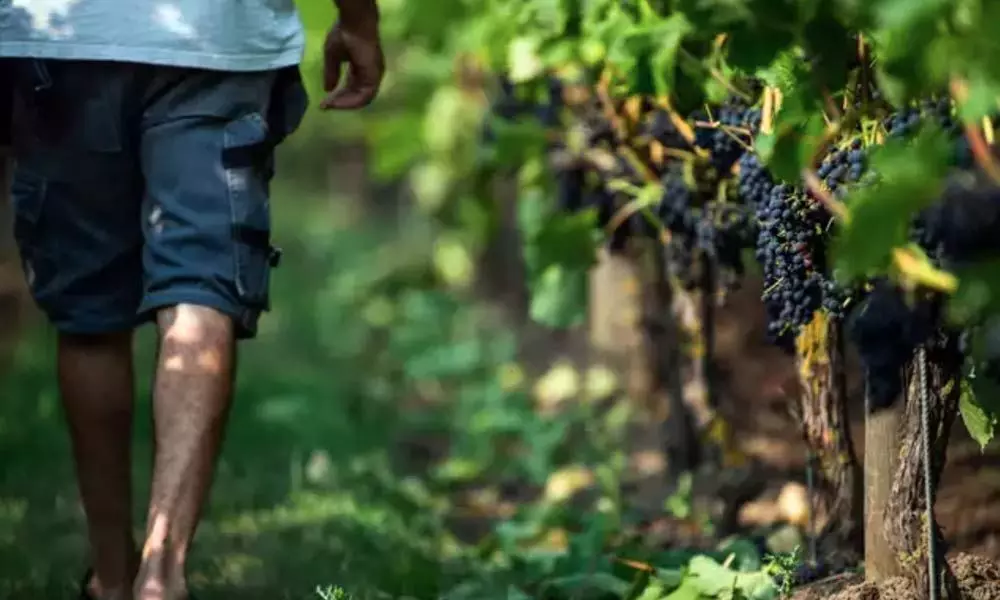Here's why your next vacation should be winemaking at the Nordics

Making wine in the Nordic countries is far from the glamour associated with Europe's famed wine chateaux
Far from glamour
Making wine in the Nordic countries is far from the glamour associated with Europe's famed wine chateaux: there the sun is fickle, the season is short and diehard aficionados work up to more sweat than wine but climate change is helping boost harvests.
One of Sweden's biggest winemakers
Worlds away from the thousand-year-old vineyards of continental Europe, winemaker Murre Sofrakis inspects his vines. The 51-year-old owns a vineyard of two hectares (nearly five acres) in Sweden's southern Skane province and is one of the country's biggest winemakers.
When he started out in 2001, he produced 100 litres (26 gallons) made from 17 different varieties of grapes. Sofrakis now runs two properties: his own, called Klagshamn which he manages with his wife and two employees, and another one called Fladie, where he is the winegrower.
He turns out a total of 20,000 bottles a year, almost a third of Sweden's total wine production. But that's just a drop in the bucket worldwide.
Lands used and revenue
In Sweden, only 100 hectares of land are used for vineyards, compared to 750,000 in France.
And the money can't compare to that made by winemakers in Bordeaux, Napa Valley or the Andes.
According to the Federation of Swedish Farmers, Swedish winemakers' average revenue in 2016 amounted to 600,000 kronor (56,000 euros, $62,000).
Self-taught amateurs
Nordic winegrowers are self-taught amateurs for the most part, but lately, they've begun recruiting experts, often from abroad.
Sofrakis has hired 31-year-old Chinese oenologist Jixing Ding as his master winemaker to help him make a better product.
German hybrid grape
Nordic vineyards primarily produce a white wine made from Solaris, a German hybrid grape that holds up well in the cold Scandinavian climate, where the grapes have only a short time to ripen.
Solaris is "very easy to grow in terms of robustness to diseases. It's relatively vigorous," University of Copenhagen professor and cold climate winegrowing expert Torben Andersen said.
Despite the difficult conditions, winegrowing is expanding in the region.
Rising temperature good for business
Sveneric Svensson, head of the Swedish Winegrowers' Association, says the trend is "not due to climate change, but to new types of grapes" that don't need high temperatures to ripen.
Rising temperatures have however led to better harvests.
An increase of "one degree in a century, it's helping... We see changes that make it easier and more fun," says Andersen.
The summer of 2018 was unusually hot, yielding an exceptionally large vintage.
The 'organic' label
In Sweden, about 30 winegrowers sell their wines, and just under 100 in their southern neighbour Denmark.
Only one vineyard in the Nordic region holds the appellation origin protegee (AOP) -- Europe's badge of quality for a special product rooted in its region: the Dons vineyard in Denmark.
While many Nordic winegrowers claim to produce organic wines, few are actually able to stick an official "organic" label on their bottles, as the administrative process is considered too painstaking and pricey.
Selling
Nordic wines are mainly sold locally.
While Danish winemakers are allowed to sell their product at their vineyards, that is not allowed in Sweden and Finland, where state-run monopolies are the only ones allowed to sell alcohol.
Not ready for the world
"Ninety-five per cent of people who taste test it (Swedish wine) blindly think it has a good bouquet and that it tastes very good," says sommelier Mattias Safvenberg.
Meanwhile, viticulture professor Andrew Reynolds at Canada's Brock University says "the quality is already more than acceptable and will improve with time and with the introduction of other varieties."
But Swedish wines aren't ready to take over the world just yet -- contrary to the country's sommeliers, who regularly place at the top in international competitions, such as Jon Arvid Rosengren who was named the world's best sommelier in 2016.
















